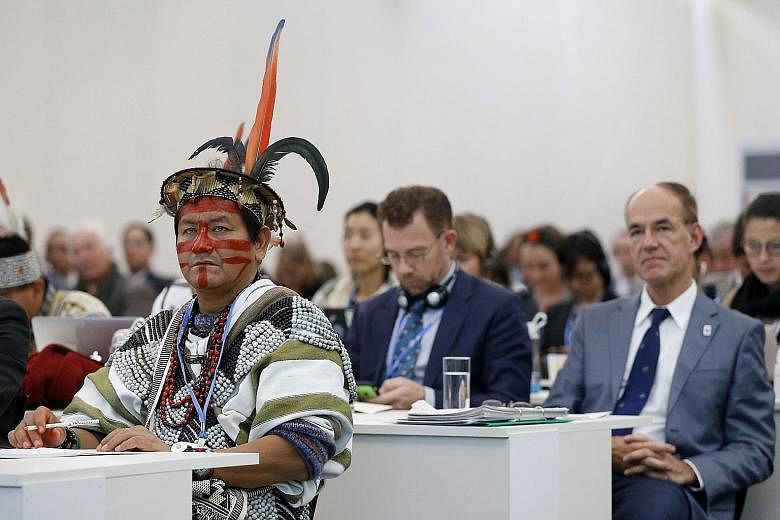Saving forests has become a key topic at the Paris climate talks with major forest nations throwing their weight behind greater conservation and more financing initiatives.
Forests, which soak up large amounts of carbon dioxide, are seen as an important tool in putting the brakes on climate change. On the opening day of the talks on Monday, leaders from some of the world's major forest nations and partner countries endorsed forests as a key climate solution.
Germany, Norway and Britain also announced a collective aim to provide US$5 billion (S$7 billion) from this year to 2020 if countries pursue ambitious Reducing Emissions from Deforestation and Forest Degradation (REDD+) programmes.
In Paris, the REDD+ programme is expected to formally launch after years of negotiation, potentially unlocking more finance to invest in forest preservation and restoration projects in poorer nations.
But while the pledges and sentiments sound hopeful, forest experts say the reality could prove otherwise.
Deforestation rates in many of the main tropical forest nations are high, and corruption and law enforcement is weak, meaning funds, though available, will struggle to be disbursed.
"I don't think there is one country in this place that is saying forests shouldn't be a piece of the agreement because it's one of the easy pieces," said Dr Charles Barber, director of the Forest Legality Alliance and Government Relations Forests Programme for the Washington-based World Resources Institute think tank.
The Paris talks aim to finally seal a global deal in curbing greenhouse gases blamed for heating up the planet. Deforestation is responsible for about 12 per cent of mankind's greenhouse gas emissions, so halting forest destruction, particularly in tropical rainforests, and replanting is regarded an easy win in the climate fight.
Nations are also being asked in Paris to recognise the myriad other benefits that forests bring, such as being huge storehouses of plant and animal species, watersheds for rivers and the home and source of livelihoods for more than a billion people.
"A lot of countries see forests as a low-cost option for mitigation between now and 2020," said Dr Rosalind Reeve of the Ateneo De Manila University, referring to emissions cuts.
But she said it was crucial the final text of the Paris agreement, expected to be adopted late next week, ensured any forest-related carbon sequestration programmes did not damage what negotiators term the environmental integrity and resilience of natural ecosystems.
The text also needed to ensure human rights, particularly indigenous rights, were protected. This has become a major issue at past climate meetings. "We want to ensure that the climate actions nations undertake are the right ones," she said on the sidelines of the Paris talks. While some projects might look good, they can have disastrous local consequences because of poor research on likely impacts.
Forest experts say the availability of cash for forest preservation and increasing scientific evidence of forests' role in fighting climate change have lifted the mood.
A study released last month by Washington-based NGO Forest Trends found that US$3.7 billion had been committed to REDD+ projects in 13 nations between 2009 and last year. More than half the money came from individual donor countries, with Norway contributing the most funds. Brazil and Indonesia together received nearly two-thirds of all funding pledged or committed.
The reality, though, is that deforestation rates in key forest nations such as the Democratic Republic of Congo, Indonesia and Peru remain high. South-east Asia, overall, has lost large tracts of rainforest, with only about 10 per cent left in Cambodia, while Chinese loggers are stripping forests in parts of Myanmar.
Under REDD+, forest preservation and restoration projects will receive funding based on pay for performance, or emissions reductions that can be fully measured.
"When it's pay for performance, would you pay a country with widespread systemic illegal logging and clearing going on for a verified emissions reduction that you have to match up to your standard in the US or Europe? I think that's going to be hard," said Dr Barber, a former US climate negotiator.
David Fogarty

